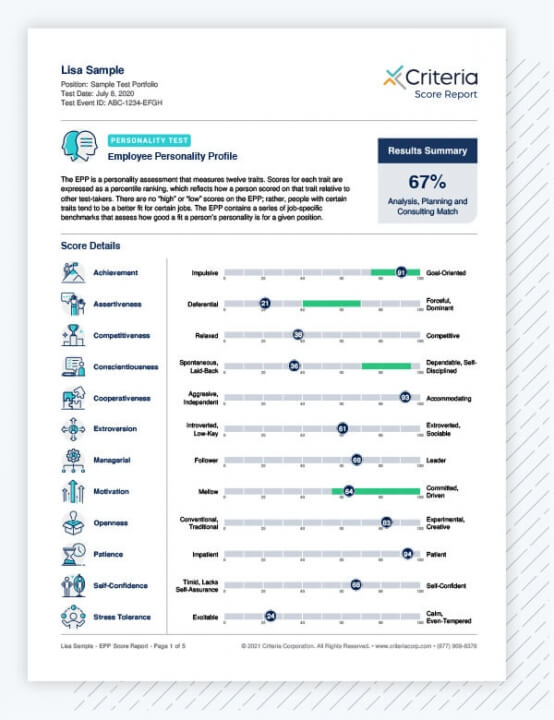Employee Personality Profile (EPP)
Measures:
- Achievement
- Competitiveness
- Conscientiousness
- Extroversion
- Openness
- Patience
- And more!
Recommended for:
- As a general personality assessment, the EPP can be used for any position. Apply the job-specific benchmarks to find a job match.

Test Description
The Employee Personality Profile (EPP) is a general personality inventory that measures twelve personality traits that provide valuable insights into a person's work styles and how they are likely to interact with co-workers, management and customers. It can be used for any position, and contains job-specific benchmarks that allow administrators to compare an individual's scores against composite profiles to determine likely job fit.
The EPP contains 140 items, takes about 10 minutes to complete, and measures the following traits: Achievement, Assertiveness, Competitiveness, Conscientiousness, Cooperativeness, Extroversion, Managerial, Motivation, Openness, Patience, Self-Confidence, and Stress Tolerance.
Detailed Score Reports
The EPP score report displays an individual's percentile ranking for each of the twelve traits, as well as a description of what the score in each trait means. There are no right or wrong answers on personality tests; however, individuals with certain personality characteristics may be better suited for some jobs than others. For example, extroverted individuals typically are more comfortable in, and perform better at sales jobs than do introverts. Conversely, introverts may be a better fit for accounting positions.
The EPP score report also contains a series of job-specific benchmarks that assess how good a fit a person's personality is for a given position. The benchmarks for each job family calculate a person's job match score by comparing their EPP trait scores to composite profiles created and validated by Criteria Corp. These profiles are based on large samples of people in the respective positions and on validity studies conducted by Criteria Corp.
Validity Information
Construct Validity: The EPP is based on the most widely validated system of classifying personality, the “Big Five” or “Five Factor” model. The EPP trait scores have been compared with a number of external measures of similar individual characteristics, including the Sixteen Personality Factor (16PF). These comparisons provide strong support for the construct validity of the EPP scales.
Predictive Validity: The individual traits measured by the EPP have been shown to be predictive of success for a wide variety of positions in many different industries. The job-specific benchmarks and accompanying "job family match" scores are based on tens of thousands of EPP administrations and on smaller validity studies conducted by Criteria Corp. The best way to ensure the predictive validity of EPP traits for specific positions is to do a local validity study that demonstrates a correlation between individual trait score(s) and job performance metrics for a given family of jobs.
Reliability: The estimated test-retest reliabilities for EPP scale scores range from .67 to .90 and are well within acceptable psychometric limits.
Standardization Sample
Norms for the EPP were developed using a sample of 1,375 individuals aged 15 and older, of which 48% were male and 52% were female. These individuals were being assessed for job selection, placement, promotion or career appraisal. About 30% were students and the balance were adults ranging in age from their early 20s to mid-60s. Their current work situations included executive positions in technical and service-oriented areas, managerial positions, and sales positions. About 10% of the sample were Black and 2% were Hispanic. In establishing standardized scores for the final version of the EPP, normalized T-scores were first developed on the large, stable standardization sample for EPP scores.
Copyright ©2021 Criteria Corp. Content adapted from the SalesAP and/or Customer Service AP copyright ©2002 Western Psychological Services, and used by permission of the publisher.
Languages Offered:
- English (US) - Default
- Arabic
- Chinese (Simplified)
- Czech
- Danish
- Dutch
- English (UK)
- French (Canadian)
- French (France)
- German
- Italian
- Japanese
- Polish
- Portuguese (Brazilian)
- Portuguese (Portugal)
- Romanian
- Slovak
- Spanish (Castilian)
- Spanish (Latin American)
- Swedish
